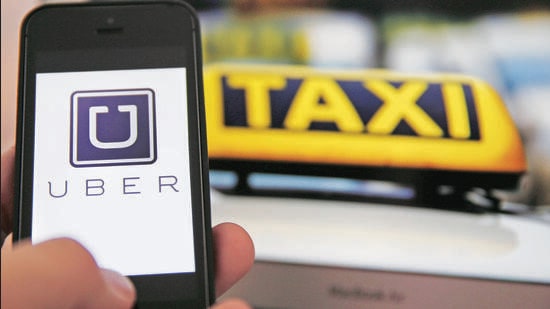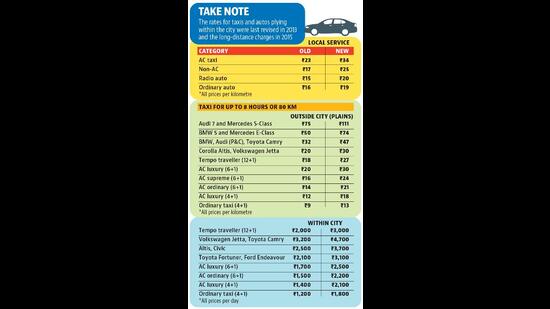Chandigarh: Brace for more price pain as taxi, auto fares go up
Chandigarh administration increases fares for autos and taxis hired for travel within the city and out of station; the long-distance fares were last revised in 2015
A day after the UT administration notified the water tariff hike, it also increased the charges for using taxi and auto services in the city.

The revised fares are classified based on whether the taxis and autos ply within the city or out of station. These will not be applicable on cab aggregators like Uber and Ola.
The rates for taxi travel within Chandigarh have never been increased since 2013, while the long-distance fares were last revised in 2015.
Under the revised charges, hiring an AC taxi for local travel will now cost ₹34/km instead of ₹23/km, while a non-AC taxi will charge ₹25/km instead of ₹17/km.
For radio autos, the fare has been increased from ₹15/km to ₹20/km, and a ride in an ordinary auto will cost ₹19/km in place of ₹16/km. Similarly, charges for various kinds of taxis have also been revised when hired for up to eight hours or 80 km of travel, within Chandigarh and outside the city. (See box)
“We have created a formula, after considering averages for fuel, wages and maintenance costs, to fix the rates. Through the formula, the fares will be revised annually at the start of the new fiscal year,” said Nitin Kumar Yadav, UT home and transport secretary.
He added that these rates were applicable on only the taxis and autos registered with the Chandigarh administration. Similar vehicles registered with other states, like Punjab and Haryana, are governed by rates stipulated by their respective governments.
“Similarly, these will not be applicable on cab aggregators like Uber and Ola. For these, a separate notification will be issued,” said Yadav.
There are more than 6,000 registered autos in Chandigarh, while around 500 ply to the city from Panchkula and Mohali.

Stricter compliance
The administration will be introducing a new mechanism to enforce the prescribed rates for autos and cabs. “We want to ensure that people have clarity about the costs and charges. The rates should be reasonable for both consumers and service providers. This will encourage compliance,” said Yadav.
Imposition of reasonable rates will also allow the administration to implement use of pre-paid meters. “Like in our bus service, we will try to move towards the pre-paid system. Nodal centres will be created to dispense coupons or tickets that can be used as per the passenger’s requirement,” he added.
“We will also be introducing an app-based system to better monitor compliance of prescribed fares. We will randomly inspect autos and taxis for better implementation, and the grievance redress mechanism will also be strengthened,” the transport secretary said.
On the increase, Hitesh Puri, chairman, Chandigarh Residents’ Association Welfare Federation (CRAWFED), said, “It is understandable, as the cost for operating taxi and autos is increasing by the day. But the administration should have taken residents on board before putting additional financial burden, which comes only a day after the hike in water tariff.”
Meanwhile, Chandigarh Taxi Owners’ Association president Ramesh Ahuja said, “We welcome the increase in rates, but these will be mostly inconsequential for us. There is very high competition in the market, which forces us to charge fares reasonably.”





